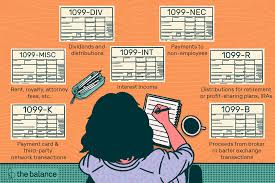Have you earned rental income, investment income, or worked as an independent contractor? Did you remember to get a Form 1099?

In any case, remember that the current tax season for 1099 employees is, as usual, between January 31, 2022, and April 15, 2022, when you, like any working resident or nonresident, must file a U.S. tax return with the IRS.
Form 1099
Have you asked yourself, "What is a Form 1099, and what is its difference from the W2 form?"
The W2 form is required to report income if you have been formally hired and earned money through tips (as a waiter, bartender, doorman, etc.).
1099 is a series of forms with the same number but different indices, reflecting the receipt of money from someone, not your primary employer, when the payment is made.
When Should I Receive a Form 1099?
You should ask for it in the following circumstances:
- If you earned $600 or more in remuneration from a person or business that is not normally your employer, you should receive a Form 1099-NEC.
- If you gained $600 or more by rent or royalties, you must get a Form 1099-MISC.
- If you received a tax refund from a state or local government during the previous year, you should get a Form 1099-G.
So, Form 1099 shows a variety of income, including independent contractor income and payments such as gambling money you've won, leases or roofies, gains and losses on brokerage accounts, dividends, profits from dividends and percentages, and more. While being an independent contractor or freelancer, you will frequently generate income for Form 1099.
Tax Liability for 1099 Employees
You must receive most 1099 forms by January 31 to report payments for the previous year. When a tax season begins, you must file your tax return. A Form 1099 is provided as proof of your income. You should only file it if that income is more than $600.
Should you not be provided with one of the required 1099 forms on time, you could always make a copy yourself using a paystub generator from a reliable provider. Remember, this is a copy, and any misrepresentation of the information can result in you being accused of falsifying documents.
Keeping Tax Returns
When a tax season ends, you possibly feel like you have got rid of the burden, and now it is a good time to exhale and relax until it all starts again next year! But before you completely put all tax issues out of your mind, you should add a new return to the ones you already have in your possession each year.
It is imperative to carefully manage and keep all your tax records and documentation, including a copy of your tax return. You may need them in certain situations.
According to the IRS statute of limitations, the basic rule requires that you keep all important tax documents for at least 3 years after the filing date. In other words, if you filed your return in 2020, you must keep all tax documents related to it until 2023.
It's a good idea to help you keep your records for more than three years in some cases. For example, you must keep tax forms for retirement accounts, such as an IRA (individual retirement account), for seven years after the account is destroyed. It's a good idea to keep all your U.S. tax records for at least 3 years after you leave the U.S.!
Also, if you buy or sell real estate, you should keep property records until the expiration of the limitations period of the year when you dispose of the property.
Summary
You should use Form 1099 when reporting non-employment income, including dividends paid from stock ownership, the income you received as an independent contractor, interest income, local tax refunds, and retirement account payments.
Whether or not you received all 1099 forms, taxpayers are required to report income when they file their tax returns. Also, seek tax help if you are a taxpayer and have questions about your non-employment income or properly reporting that income to the IRS.


















